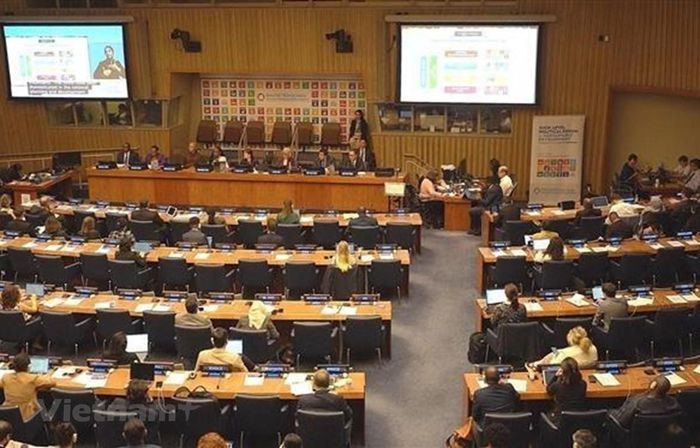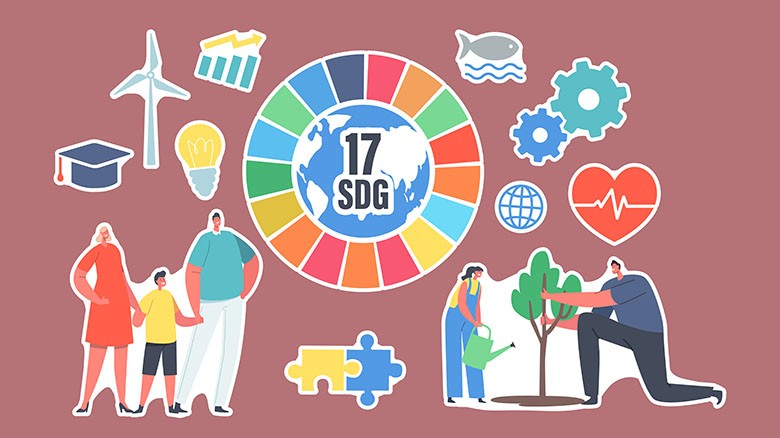
Digital Transformation: A Path to Innovation and Inclusive Growth for Vietnam
Latest
 |
| Digital Transformation: A Path to Innovation and Inclusive Growth for Vietnam. Photo is UN High-Level Political Forum on Sustainable Development. (Photo: VN+) |
Vietnam has recognized the catalytic role of digitalization. Through the adoption of ambitious national targets that support the overall vision of a prosperous digital country by 2030, Vietnam sets out fundamental and comprehensive reforms in Government operations, the economic activities of businesses and the ways that people live and work.
Important Milestones
The United Nations Development Programme (UNDP) places digital transformation at the centre of our global work, with a focus on creating a world where digital transformation acts as a key empowering force for people and planet through economic empowerment, access to information and services, and digital literacy. In line with this global approach, UNDP is supporting Vietnam to mainstream digital solutions to enhance transparency, inclusivity, and e-governance services delivery, contributing to the country’s national digital transformation goals.
The approval by the Prime Minister of the "National Digital Transformation Programme by 2025, with orientations toward 2030” on June 3, 2020, was a key milestone in Viet Nam's digital development. It reflects Viet Nam’s aspiration to become a leading digital country and economy in the ASEAN region by 2030 and promote comprehensive testing of new technologies in the digital economy. The programme sets out key tasks that Viet Nam needs to undertake to develop a digital government that is efficient, transparent, and accessible to all citizens, to create a digital economy that is inclusive and sustainable, to build a digital society that is safe, secure, and equitable, and to establish Vietnamese digital businesses with global capacity.
Vietnam’s national programme rightly places people at the centre, highlighting digital transformation as a key method to achieve the United Nations Sustainable Development Goals (SDGs). It emphasizes crucial areas such as digital infrastructure, human resources, policy development, and research and development. Through this programme, the country aims to improve the competitiveness of its economy, with the digital economy accounting for 20% of overall GDP and annual productivity growth of at least 7% by 2025. One of the key targets is enabling 80% of online public services at level 4 to be accessible through mobile devices by 2025, ensuring the integration of digital advancements into every aspect of governance.
With this national programme, Vietnam has positioned itself well to leverage its potential in digital transformation. The total number of ICT personnel in Viet Nam has reached about 1.15 million people, with 160 universities nationwide offering technical training programmes in this area. By May 2022, all 63 provinces had established a Digital Transformation Steering Committee, and 55 out of 63 localities issued resolutions on digital transformation and 59 localities issued digital transformation programs/projects or plans for a period of five years, demonstrating concrete political determination to meet the targets that the Prime Minister set out. Furthermore, there has been robust adoption of digital transformation within businesses, with many ICT enterprises taking on a pioneering role in areas of research, development, and innovation, playing a significant role in advancing technology and contributing to the growth of the digital economy.
However, Vietnam's journey towards digital transformation is not without challenges. A key requirement for digital transformation is the establishment of a new, high-quality digital infrastructure system across the country. This requires considerable investments in high-speed broadband connectivity, covering large cities, information technology hubs and industrial zones but also reaching nationwide to connect rural and remote areas, reaching state agencies, schools and healthcare facilities, and ultimately every home. It also requires a substantial investment in the development of effective digital platforms that can support transformation of government, business and society while ensuring a safe and secure digital environment.
There also remains a considerable gap in digital literacy among Vietnamese users. While around three quarters of Vietnamese people are internet users, making Viet Nam one of the most connected countries worldwide, many people particularly in rural areas still prefer to use cash rather than digital wallets or online bank accounts and financial services. UNDP’s most recent annual Public Administration Performance Index (PAPI) survey in 2022 found that less than five percent of respondents nationwide had accessed e-governance services via the National E-Service Portal. The development of effective online services needs to go hand-in-hand with awareness raising and development of digital literacy, supporting people to move from cash- and paper-based processes to access digital e-governance and financial services, cashless payments and other digital services confidently and safely while maintaining options for those not yet able to access digital services.
Ensuring equitable digital access across all segments of society also presents a challenge, particularly in remote and mountainous regions of the country and for poor and vulnerable households. In remote and underserved regions, access to reliable internet connectivity and digital devices can be limited, inhibiting the widespread adoption of digital services. While digitalization has the potential to empower marginalized communities, the digital divide remains a concern and sustained and strategic efforts are needed to ensure that no-one is left behind.
Amid these challenges, UNDP is drawing on its expertise and international experience to support Viet Nam’s digital transformation journey in partnership with the Government of Viet Nam including focal point ministries such as the Ministry of Industry and Trade (MOIT), the Ministry of Planning and Investment (MPI) – National Innovation Centre (NIC), and the Ministry of Science and Technology – National Technology Innovation Centre (NATEC), as well as with specific sectoral ministries to support key components of their digitalization plans.
UNDP's role in Vietnam's digital journey is multifaceted, embracing a portfolio approach that focuses on enhancing transparency, expanding inclusivity, and improving e-governance service delivery.
A notable success story is UNDP’s partnership with the Ministry of Health (MOH), provincial Departments of Health in eight provinces to develop, pilot and scale up the "Doctor for Everyone" grassroots telehealth system “Doctor for Everyone” is a web-based digital platform and smartphone application that supports commune health facilities to connect with higher level and specialised medical facilities and experts to support medical consultation, examination, and treatment access for people directly at the commune health station, including in remote and mountainous regions and in areas particularly vulnerable to climate change impacts. This initiative has empowered healthcare workers, particularly those in rural areas, and substantially improved healthcare services for vulnerable communities. The initiative's growth trajectory is remarkable, with over 5,000 health care workers and 755,000 community members establishing accounts. More than 28,000 community members utilized “Doctor for Everyone” services from March 2023 to the end of June 2023, with over 2,693 telehealth video calls conducted for patient consultations and trainings.
UNDP has also worked in partnership with the Ministry of Labour, Invalids and Social Affairs (MOLISA) to build a more resilient, shock-responsive, integrated, and universal social protection and accelerate socio-economic development and multi-dimensional poverty reduction. Particularly during COVID-19 social distancing, UNDP supported MOLISA to test e-payment and e-registration methods for beneficiaries of social protection packages. Successful tests of e-payment systems for ethnic minority women were conducted in five provinces, including Bac Kan, Dak Nong, Ha Giang, Bac Lieu and Ca Mau, providing these women with access to e-money transfers through their phones or banking accounts. In a further four provinces, including Bac Giang, Thai Nguyen, Quang Nam, and Binh Phuoc, UNDP supported the transition from paper-based, door-to-door surveys to digital self-registration for social assistance support, empowering citizens to proactively declare their multi-dimensional poverty situations, fostering inclusivity and efficient data collection. The digital self-registration system is set to be scaled up nationally, contributing to a more comprehensive understanding of poverty and enhancing the speed, efficiency and effectiveness of interventions.
Initiatives to attract people's participation
In 2023, UNDP and the Institute for Policy Studies and Media Development (IPS) launched the results of a review of accessibility and user friendliness of Vietnam’s 63 provincial/city E-service Portals. This review aimed to identify gaps in digital competencies between service providers and users, informing a training program for public sector personnel to bridge these gaps and prioritize user-first approaches. This review identified practical recommendations to strengthen people’s accessibility and use of provincial e-service portals, including developing user-friendly and effective search tools, including: (1) easy accessibility, with the search tool prominently displayed on the homepage; (2) optimization of keyword-based search and the inclusion of suggestions for closest search results; and (3) inclusion of the voice search functionality. The recommendations also aimed to support accessibility for specific groups of users such as people with visual impairments and ethnic minorities, for examples through including tools such as screen reader browsers and voice search functionality, and video guidance on how to log in and search for procedures in major ethnic languages.
 |
| Digital Transformation: A Path to Innovation and Inclusive Growth for Viet Nam. (Photo: UNDP) |
In the realm of policy advice and advocacy, UNDP's involvement has been instrumental. Initiatives like the Public Administration Performance Index (PAPI) and the Social Assistance Project II (SAP-II) have created avenues for assessing e-governance progress and fostering policy advocacy through digital reporting systems and digital self-registration processes. These initiatives enable the integration of citizen engagement in policy development and governance systems.
UNDP is also partnering with the Ministry of Agriculture and Rural Development (MARD) to introduce an innovative e-traceability system to track the origin and carbon footprints of each dragon fruit produced in Binh Thuan province, enabling local and international consumers who buy or import dragon fruits from this key production region of Binh Thuan to scan a QR code to trace the fruit origins and the levels of “green” or environment-friendly practices applied to produce the fruit. UNDP is also working with the Viet Nam Disaster Management Authority (VNDMA) within MARD to support upgrading and digitalization of the Viet Nam Disaster Monitoring System (VNDMS). UNDP also works with other national and provincial counterparts to promote digitalization as a cross-cutting issue of our overall programme in Viet Nam.
Digital transformation is a multifaceted endeavour that involves integrating digital technology into various areas of a country's operations. For Viet Nam, learning from the experiences and best practices of others can be instrumental in streamlining their own transformation journey and below are some initiatives that have already seen some benefits but could be expanded on with a Vietnamese context.
UNDP is ready to share further lessons and models developed through our global Digital Strategy that could be adapted by Vietnam to support national digital transformation. For example, UNDP has partnered with the Government of Estonia to share Estonia’s widely recognized expertise in developing e-government platforms that ensure seamless interactions between the government and citizens. In Türkiye, UNDP is supporting digital transformation of small and medium enterprises (SMEs) through training and consultancy to develop integrated models to improve productivity and competitiveness. Vietnam could adopt similar strategies to support its own SMEs to compete in the global marketplace in the Industrial Revolution 4.0 context.
Other lessons and models are also available across our global work to support the development of digital infrastructure, digital payment systems, regulatory frameworks, cybersecurity and safety, and private public partnerships to accelerate digital transformation.
As these digital initiatives gain traction and deliver impactful results, the UNDP's commitment to furthering these efforts alongside the Government of Vietnam and other stakeholders remains steadfast. Vietnam’s commitment to the transformative power of digitalization, coupled with UNDP's strategic engagement, is well placed to drive inclusive growth, resilience, and equitable development. As the nation navigates the intricate landscape of digital innovation, the UNDP's role as a trusted partner and facilitator of knowledge exchange remains integral to shaping a digital future that leaves no one behind.

















